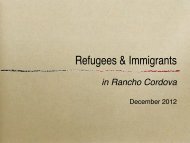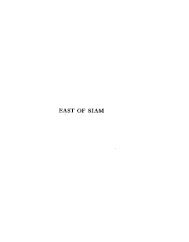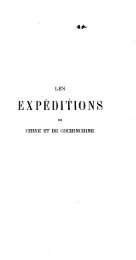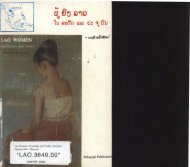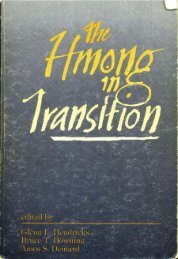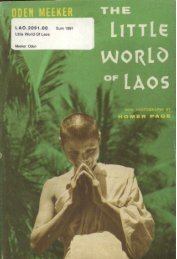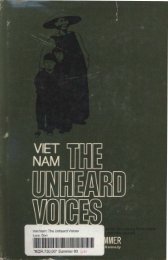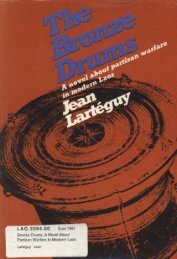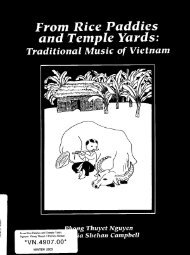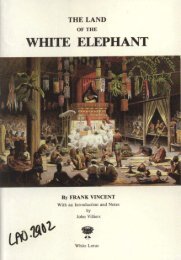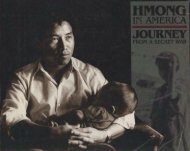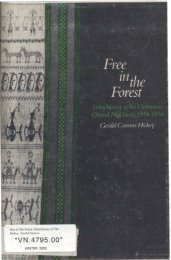PEOPLE
Grant, The Boat People - Refugee Educators' Network
Grant, The Boat People - Refugee Educators' Network
- No tags were found...
Create successful ePaper yourself
Turn your PDF publications into a flip-book with our unique Google optimized e-Paper software.
The Boa! Aopk<br />
levels because it wanted to 'play the China card'. Proponents of thb<br />
thesir prgue that, as early ns Decemkr 1977, the Carter adminismtion<br />
had concluded that normalization of relations with Vietnam and<br />
China were 'eithtr/or propositions', and that if the US pressed ahcad<br />
with the Vietnam negotiations it would antagonize kking and fru~<br />
rate efforts to reach agmmcnt with China on the exchange of diplomatic<br />
reprcscntativcs and the resumption of normal trade.<br />
An elaboration of this thesis proposed that Vietnam was in &ect<br />
driven into a closer alliance with the Soviet Union by the antagonism<br />
of China and its support for the hl Pot rdgime, and by fears that<br />
the US, in its enthusiasm for normal relations and trade with China<br />
to cwnterbrlancc the Soviet's regional influence, delibemtely<br />
slowed down negotiations with Vietnam. Smior state department<br />
officials agreed th~t US recognition of Viemam had been a sensitive<br />
issue for the Chinese in 1978, and an even more sensitive one in<br />
1979, when China and the US had resumed normal relations and<br />
China and Vietnam had fought a limited border war. But they<br />
claimtd that the issue had never been directly raised with the Chinese<br />
during negotiations for nomlization in 1978, and that 'thm<br />
was no particular reaction from the Chintse' when American negotiations<br />
had referred to it by hint or inferenec.<br />
On August 12 1979, Mr Holbrooke resmrtd the American position<br />
that 'present circumstances m~dc it impiblc and undesirable<br />
to resume progress towards normalization of relations' with Victmm.<br />
Some future movement was not impossible, he aid, but it<br />
depended on 'Viemam's actions'. The US had already given its conditions<br />
for a resumption of negotiations during rhe abortive tslks<br />
with Vietnamese representatives in New York and Geneva in June<br />
and July: an independent gwernmcnt in Kampuchea, oontrol of the<br />
refugee exodus, and assurances about Vietnam's new relationship<br />
with the Soviet Union.<br />
While they had no finn formula for 8 settlement in Kampuchea,<br />
US officials could see no possibility of stability in the region unless<br />
here was a government in Phnom Penh that represented a11 three<br />
contending forces: the deposed Pol Pot faction, still fighting in the<br />
jungles with the support of kking and claiming representation at<br />
the United Nations; the Hcng Samrin kgime, installed by Vietnamese<br />
force md sustained and apprenrly controlled by Hanoi; and the<br />
Stability<br />
'third force' of nationalisw, rallying uneasily around the exiled<br />
former prince, Norodom Sihanouk. Such an improbable coalition<br />
was, they agreed, unlikely in the foreseeable future.<br />
Although Americans had been encoutagcd by the apparent change<br />
of Vietnam's policy at the Gcnkva refugee conference in July, and<br />
by Hanoi's formal but dl1 unfulfilled agreement to admit American<br />
consular officials to proeess applicants for family reunion in the US,<br />
the adminimation was reserving judgement on Vicmam's intentions<br />
and its ability to administer a humane refugee policy. The US<br />
demand for reassurances abut Vietnam's Russian connection was<br />
a grey area - less a formal precondition than a warning that growing<br />
Soviet influence in Viemm would inevitably impede progress<br />
towards normalization, In Hanoi, on 9 August, the Viemamese setretary<br />
of state for foreign affairs, Nguyen Co Thach, bluntly toid<br />
a visiting American congressional delegation: 'The US established<br />
relations with China with no conditions. , , this is a double standard.<br />
This is the China card . . . All over the world, no country hs used<br />
relations with a third country as a condition for normalization.'<br />
Of the three American conditions, the future of Kampuchea was<br />
the most critical and the moat intractable. But ir was widely acknowledged<br />
in Washington that there was lictle chance that Vietnam would<br />
quickly or easily change its position on any of them, ceminly not<br />
un Kampuchea or the Soviet connection. Some analysts predicted<br />
there would bt no change in Vietnam's policies until Hanoi's present<br />
lcaders, still inspired by the 'curse-he-enemy' values they had<br />
applied so successfully during more than thirty years of war, had<br />
bcen rcplaced by a generation more susocptible to compromise and<br />
more attuned to economic reconstruction and social reform.<br />
Although the average agc of the scventtcn-member politburo in<br />
Hanoi was sixty-nine, there wau little confidence in Washington that<br />
a new leadership was about to emerge.<br />
There was general agreement among US officials that the issue<br />
of normnlization was dead - at least until after the presidential tlections<br />
in 1980. Therc was no effective constituency pushing for a<br />
resumption of negotiations: Amerians, for the most part, preferred<br />
to avert their attention from Viernam. There were no dear and compelling<br />
economic incentives for the resumption of economic, much<br />
less political, relations with Vietnam. The American chamber of





